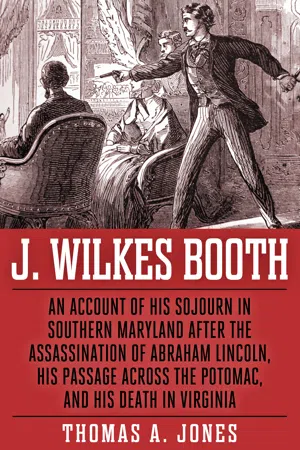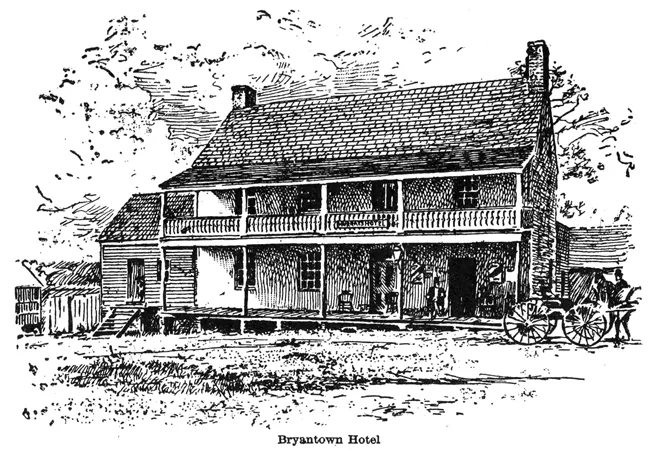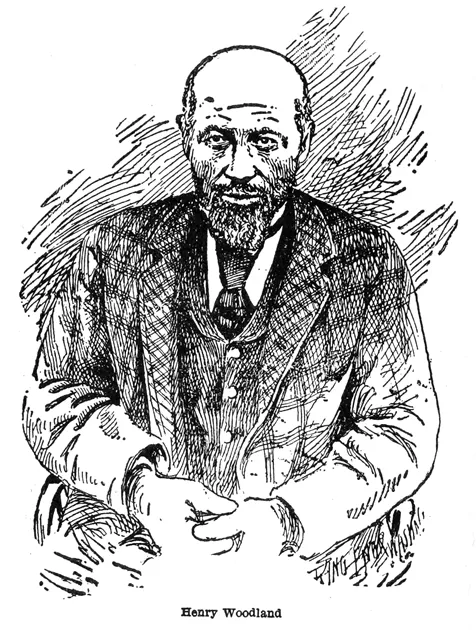
- 66 pages
- English
- ePUB (mobile friendly)
- Available on iOS & Android
eBook - ePub
J. Wilkes Booth
About this book
J. Wilkes Booth: An Account of His Sojourn..., first published in 1893, is the straight-forward account of the doomed escape of John Wilkes Booth following his assassination of Abraham Lincoln. The book was written by Thomas Jones, a Confederate agent who helped Booth evade the authorities for five days by hiding the assassin near his house in Maryland. Illustrated with 18 pen and ink illustrations.
Tools to learn more effectively

Saving Books

Keyword Search

Annotating Text

Listen to it instead
Information
VII. MY ARREST AND IMPRISONMENT
The morning after I had taken Booth to the river Cox came to my house to say that, as there seemed to be no soldiers in the neighborhood, he thought it a good chance to get the fugitives across to Virginia. His surprise almost equaled his delight when I told him they had gone. Had I waited until Saturday night it would have been one day too late, as before evening the neighborhood was again filled with soldiers and detectives.
Sometime prior to the assassination of Lincoln a man named Carson, who was in Maryland on some secret business for the Confederacy, came to me to get put over the river.
It was impossible at the time for me to put him across, so I hid him in Ware’s pines, a short distance back of my house, until such time as it would be safe to move.
He had to remain in hiding several days and, thinking more of his own comfort than my safety, he built a kind of swinging booth of grape vines and boughs to lie in. When he went away he left behind him at this place a pair of socks and an old newspaper.
Some negro boys living on Ware’s land happened to pass by this spot while Carson was there and saw him. Of course they told what they had seen. And when Detective Franklin was searching for Booth, it got to his ears that Mr. Jones had been hiding someone in the pines. Franklin visited the spot and found the things Carson had left there. He sent two soldiers across to my house after me. These soldiers told me to saddle my horse and come with them. I inquired what they wanted and was told I would be informed of that by Detective Franklin, who was waiting to see me.
“Where do you want me to go?” I asked.
“Just behind the stable there, in the pines,” was the answer.
“Then,” I replied, “it is unnecessary for me to get my horse. It is a short distance and I can walk.”
They insisted for a while that I should get my horse, but as I persistently refused they finally gave up the point and allowed me to walk.
When I reached the spot where Carson had staid, Detective Franklin pointed to the booth and asked me what it was.
“I don’t know,” I answered, “what you would call it.”
“Well, what does it look like?” he inquired.
“It looks like the kind of place the farmers around here fix up to protect their hogs from the weather,” I replied—as indeed it did.
“And I suppose,” retorted the irate detective, “the farmers’ hogs wear socks, and read newspapers.”
“Indeed!” said I.
“Look here,” said the detective, sternly, “who built this place, and what was it built for?”
I was somewhat exasperated by my interrogator’s manner and replied:
“It is none of my business who built it or what it was built for. This is not my land and I have nothing to do with it.”
I was sorry next moment for my imprudence in giving way to temper.
“Seize that man and search him,” was the detective’s order, whereupon two of the soldiers caught hold of me and started to throw me down and pull off my boots.
“I will save you the trouble,” I said quietly and seated myself. They searched me but found nothing. I was then placed under arrest and taken to Bryantown.
Realizing what would be my inevitable fate should my connection with Booth’s escape become known, I did not feel altogether free from anxiety during my imprisonment. And yet, I was not very uneasy, because from the questions that were asked me I was sure nothing was known against me. Besides, the very evidence that pointed to the fact that someone had been hiding in Ware’s pines was against the presumption that it was Booth, because the socks were such as were worn by Federal soldiers, and the date of the newspaper showed it had been published before the assassination. About this time suspicion also attached to Cox. The negro Oswald Swann, who had guided Booth and Herold to his house, gave information against him, and swore, not only that the man with a broken leg went to the house, but that he also entered it. The latter charge was denied by Cox; and a colored girl named Mary, one of his servants, confronted Swann and swore that what he said was false.
I do not know whether Booth did enter Cox’s house or not; I never thought to ask Cox about it after all the trouble was over. If he did not, there must have been a light carried out for Cox to have been able to see the initials J. W. B., which he told me he had seen on Booth’s wrist. But be the fact what it may, there is no doubt but that Mary’s positive and persistent declaration that Booth had not entered the house—unshaken by threats or offered bribes—saved Cox’s life when it hung by a thread.
Cox and I were kept prisoners in the old brick tavern at Bryantown; the same in which Booth had stopped when in southern Maryland eighteen months before.


While there we were subjected to every method that ingenuity could devise to make us divulge something. Sometimes some of the soldiers and detectives would get together under my window and describe how I would be hanged. I would look mournful but say nothing.
Cox and I slept in a room together, lying on the floor, with our heads resting on our saddles. The first night we passed there—no one but ourselves being in the room except the two guards stationed at the door—as soon as we lay down Cox placed his lips close to my ear and whispered:
“What shall I do, Tom?”
“Stick to what you have said and admit nothing else,” I answered.
The officer in charge at Bryantown was Colonel Wells and a rougher man I have never had to deal with.
About the second day after I had been taken to Bryantown, Cox was carried away, heavily ironed, and placed in the old Carroll prison, Washington. About one week afterward I was taken to the same place.
When I was taken from Bryantown I had to leave there my mare which I had ridden from home. I was anxious that she should be sent back, so when we stopped at T. B. on our way, to get something to eat, and to rest, I asked for a sheet of paper, saying I wished to write to a friend, Dr. Dent, and ask him to send my mare back to Huckleberry. Detective Franklin, who had me in charge, expressed his entire willingness that I should write to anyone I pleased, and put himself to considerable trouble to get a sheet of paper—paper happening to be a scarce article in T. B. that day. Of course I understand that this desire to accommodate me did not spring from any kindly feeling toward myself, but was intended to encourage me to write, in the hope that I might attempt to convey some secret intelligence to Dr. Dent, who was well known to be a warm Southern sympathizer and a fearless man.
I may as well add here that this mare was The same one Booth had ridden from the pines to the river that memorable Friday night. She was a flea-bitten gray, named Kit. Had her complicity in the assassination been known, what an object of interest she would have been.
Detective Franklin had some whisky with him, which he freely offered to me. I did not seem to suspect his intention and would appear to drink. When he found he had failed to get me drunk he began to curse me and kept it up the rest of the way.
I was at first placed in solitary confinement in the old Carroll prison. But through the clemency of Col. Wm. P. Wood this lasted but a few days.
Colonel Wood was a kind-hearted gentleman. He allowed me as many privileges and as much liberty during my imprisonment as was consistent with his duty. I remember with heart-felt gratitude his kindness to me during that period when friends who could assist me were few indeed.
John T. Ford, the manager of the theater in which Mr. Lincoln was killed; Junius Brutus Booth, brother to John Wilkes, and ...
Table of contents
- Title page
- Foreword by the Society for the Restoration of Port Tobacco, Inc.
- TABLE OF CONTENTS
- I. INTRODUCTORY
- II. MY CONNECTION WITH THE CONFEDERATE MAIL
- III. THE ABDUCTION PLOT AND ASSASSINATION
- IV. BOOTH IS PLACED IN MY CHARGE
- V. I AM OFFERED $100,000 TO BETRAY BOOTH, BY CAPTAIN WILLIAMS
- VI. I CONDUCT BOOTH TO THE POTOMAC
- VII. MY ARREST AND IMPRISONMENT
Frequently asked questions
Yes, you can cancel anytime from the Subscription tab in your account settings on the Perlego website. Your subscription will stay active until the end of your current billing period. Learn how to cancel your subscription
No, books cannot be downloaded as external files, such as PDFs, for use outside of Perlego. However, you can download books within the Perlego app for offline reading on mobile or tablet. Learn how to download books offline
Perlego offers two plans: Essential and Complete
- Essential is ideal for learners and professionals who enjoy exploring a wide range of subjects. Access the Essential Library with 800,000+ trusted titles and best-sellers across business, personal growth, and the humanities. Includes unlimited reading time and Standard Read Aloud voice.
- Complete: Perfect for advanced learners and researchers needing full, unrestricted access. Unlock 1.4M+ books across hundreds of subjects, including academic and specialized titles. The Complete Plan also includes advanced features like Premium Read Aloud and Research Assistant.
We are an online textbook subscription service, where you can get access to an entire online library for less than the price of a single book per month. With over 1 million books across 990+ topics, we’ve got you covered! Learn about our mission
Look out for the read-aloud symbol on your next book to see if you can listen to it. The read-aloud tool reads text aloud for you, highlighting the text as it is being read. You can pause it, speed it up and slow it down. Learn more about Read Aloud
Yes! You can use the Perlego app on both iOS and Android devices to read anytime, anywhere — even offline. Perfect for commutes or when you’re on the go.
Please note we cannot support devices running on iOS 13 and Android 7 or earlier. Learn more about using the app
Please note we cannot support devices running on iOS 13 and Android 7 or earlier. Learn more about using the app
Yes, you can access J. Wilkes Booth by Thomas Jones in PDF and/or ePUB format, as well as other popular books in History & American Civil War History. We have over one million books available in our catalogue for you to explore.